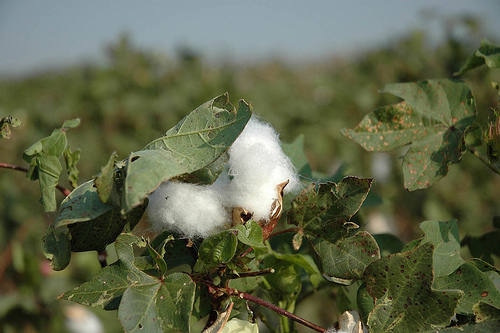January 12, 2011

In today's world of Texas cotton, large-acreage farmers may not be as apt to switch to conventional varieties as small producers, according to a Texas AgriLife Extension Service specialist.
Producers planting hundreds of acres don't have the time for hassles such as weed and insect problems more associated with conventional varieties. Take the chance and there's potential for added labor and input costs that could chip away at potential profits during times of historically high cotton prices, said Dr. Gaylon Morgan, AgriLife Extension state cotton specialist.
"When it comes to non-genetically modified cotton, some producers have just gotten so big and it would require more time and labor for them to go with conventional varieties," Morgan said. "They just won’t be able to stay ahead of the weeds."
In his presentation at the Texas Plant Protection Association conference recently, Morgan said Texas planted more than 93 percent in genetically modified cotton in 2010. When farmers make variety selections, they should consider both variety and technology that fit their farming operation.
Management system
"It dictates the type of management system they will have in place for the coming crop season," he said. "Yield is a big incentive for a producer selecting a variety that's well adapted for their area, but input cost for growing a variety, conventional or GMO, is equally important."
Morgan said a tool is available for cotton farmers to compare costs and income for conventional and genetically modified cotton at http://agfacts.tamu.edu/~lfalcone/newweb/cropbudgets.htm. The site's budgets were developed by Dr. Larry Falconer, AgriLife Extension economist at Corpus Christi, to use in comparing yields and varieties.
"I recommend producers use these budget tools to determine if conventional or GMO varieties are for them," he said.
The upfront costs of genetically modified cotton is what many producers fret about, especially when you throw in drought conditions like those in 2009, Morgan said.
"You're looking at $50 more an acre upfront cost if you go with BG2 RoundupFlex variety for seed and technology fees," he said. "However, the budget estimates indicate about a $2-an-acre difference in season-long input cost between the conventional and BG2 RoundupFlex system. Another thing that plays into this is the logistics. The Roundup Ready Flex cotton system has simplified weed management and has allowed more farmers to cover more acres while maintaining excellent weed control. So, they may not want to go back to conventional cotton systems."
Protection plans
Another consideration is product protection plans provided for genetically modified cotton varieties, Morgan said. Although difficult to quantify in a budget, most major seed companies provide a product protection plan for genetically modified cotton varieties.
"These product protection plans can offset seed and technology fees if replanting is required or if a hail storm destroys your crop mid-season," Morgan said. "However, producers should visit with individual seed companies for the specific details on these product protection plans."
There remains a strong interest in conventional cotton varieties from some producers, and several new conventional varieties are available from university breeding programs in Texas, Arkansas and Louisiana.
"Several conventional varieties are marketed through All-Tex and one from the University of Arkansas, but still Texas will probably stay at about 6 percent of the acreage in conventional varieties," Morgan said.
Producers can find yield and quality data on the Stacked-Trait and conventional cotton varieties at http://varietytesting.tamu.edu/cotton/index.htm.
For more on variety selection and other cotton production information, visit http://varietytesting.tamu.edu/cotton/index.htm.
You May Also Like




